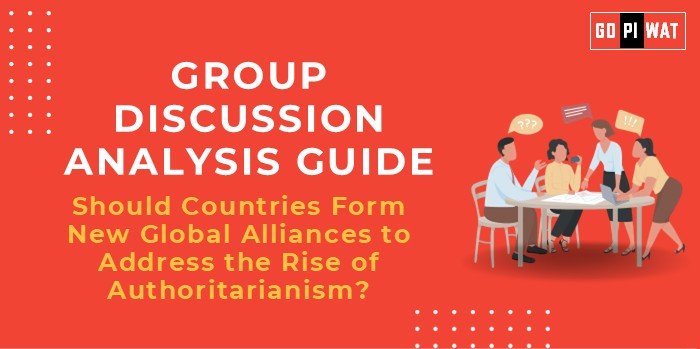📋 Group Discussion Analysis Guide
🌍 Should Countries Form New Global Alliances to Address the Rise of Authoritarianism?
💡 Introduction to the Topic
🌱 Opening Context: The global political landscape has witnessed a resurgence of authoritarian regimes, challenging the principles of democracy, human rights, and international cooperation. This trend raises the question of whether new global alliances are necessary to counter this rise effectively.
📜 Topic Background: From post-World War II coalitions like NATO to modern groupings such as the Quad, alliances have historically played pivotal roles in addressing global challenges. However, with the rise of authoritarian leaders and policies worldwide, existing frameworks may need reassessment to adapt to modern geopolitical realities.
📊 Quick Facts and Key Statistics
- 📈 Freedom House Report 2024: 60% of the world’s population lives under some form of authoritarian regime, up from 54% in 2014.
- 📉 Democracy Index 2023: Only 8% of countries are classified as “full democracies,” reflecting a global decline.
- 🌐 UN Membership Dynamics: Out of 193 UN member states, over 70 show tendencies toward centralized governance and restricted civic freedoms.
- 💰 Economic Power Shift: Authoritarian regimes control 40% of global GDP, increasing their influence in trade and diplomacy.
🌍 Stakeholders and Their Roles
- 🏛️ Democratic Nations: Advocate for human rights, free trade, and rule-based international order.
- ⛔ Authoritarian Regimes: Oppose interventions citing sovereignty, creating counter-narratives.
- 🌐 International Organizations: Mediate conflicts, impose sanctions, and promote democratic principles.
- 📣 Civil Society and Media: Raise awareness, document abuses, and mobilize international opinion.
🏆 Achievements and Challenges
🌟 Achievements:
- ✔️ Existing Alliances: NATO and the EU have successfully countered past authoritarian threats.
- ⚖️ International Norms: UN Human Rights Council resolutions against autocratic practices.
- 🤝 Public Mobilization: Global protests highlighting anti-authoritarian sentiment.
⚠️ Challenges:
- 🛠️ Fragmented Coalitions: Lack of unity among democracies.
- 📉 Economic Dependencies: Many democracies rely on authoritarian regimes for trade or resources.
- 💻 Technological Control: Authoritarian regimes exploit AI for surveillance, influencing global narratives.
🌍 Global Comparisons:
- 🇩🇰 Success: The Nordic Council’s collaboration fosters transparency and democracy.
- 🌍 Failure: League of Nations failed to prevent WWII due to weak enforcement mechanisms.
📜 Case Studies:
- 🇭🇰 Hong Kong Protests: International solidarity was limited due to trade dependencies on China.
- 🇺🇦 Ukraine Conflict: A unified response highlighted NATO’s enduring relevance.
✨ Structured Arguments for Discussion
- 💬 Supporting Stance: “Forming new alliances can provide a united front to defend democracy and prevent authoritarian overreach.”
- ⚖️ Opposing Stance: “New alliances risk exacerbating global divides and could lead to a new Cold War.”
- 🔄 Balanced Perspective: “While alliances can deter authoritarianism, they must prioritize inclusivity and avoid isolationist tendencies.”
🎯 Effective Discussion Approaches
📖 Opening Approaches:
- 📊 Start with a striking fact: “60% of the world’s population lives under authoritarian rule.”
- 📜 Use a historical analogy: “Comparing current trends to the pre-WWII rise of fascism.”
🔄 Counter-Argument Handling:
- 💡 Highlight inconsistencies in opposing views.
- 🌍 Use real-world examples, such as sanctions against Russia, to demonstrate the impact of unity.
📈 Strategic Analysis of Strengths and Weaknesses
- 💪 Strengths: Potential for unified action against global threats; enhanced economic and military collaboration.
- ⚠️ Weaknesses: Risk of alienating non-aligned nations; resource-intensive to maintain.
- 💡 Opportunities: Foster innovation and collective problem-solving; strengthen global democratic norms.
- 🚨 Threats: Risk of retaliation by authoritarian regimes; possibility of internal disagreements.
📚 Connecting with B-School Applications
- 🌟 Real-World Applications: Exploring international relations in strategic decision-making for businesses.
- 💬 Sample Interview Questions:
- “How can global alliances mitigate authoritarian risks to businesses?”
- “What role does technology play in the fight against authoritarianism?”
- 📖 Insights for B-School Students:
- Emphasize adaptability in complex geopolitical scenarios.
- Advocate for collaborative leadership and ethical business practices.


